Christmas is practically around the corner. Black Friday sales are soon to begin–some already have. (The complete Lost in Space Blu-ray set for just $74.99 on Amazon? Danger, Mastercard, danger!) Time to browse new and recent DVD and Blu-ray releases and get prepped for the holidays.
Let’s begin with a summer sleeper, The Gift–a gift that keeps on giving fans of well-crafted suspense tales. Making his feature debut as director, actor and screenwriter Joel Edgerton (Black Mass) raises the hackles as a friendly if somewhat off-balance fellow who turns up the doorstep of a married couple (Jason Bateman and Rebecca Hall) who have relocated to the husband’s hometown. But there’s more to this gift-giving welcome wagon than meets the eye–or is it Bateman, carrying the weight of long-ago secrets, the one we should be wary of? The answers aren’t so clearcut, the ending queasily ambiguous, which put some viewers off–but really, didn’t the rest also also leave you nervous, in a good way? The bad vibes build splendidly. Extras include a commentary with Edgerton (look for another movie he wrote, The Square), deleted scenes and an alternate ending, plus a peek at “The Darker Side of Jason Bateman”–one we always knew he had.
Hey, did anyone win a copy of Trainwreck yet? ‘Cause it’s awesome. Well, not totally--I had issues. But this combo pack is so stuffed with extras you hardly notice the movie, half-delightful and half-flawed, is there. I’m not fond of the top-heavy director’s cuts that Judd Apatow puts out of his work on disc, but this one is only four minutes longer (and you can still watch the theatrical cut). The id of Trainwreck pours out in the supplements, which include: a giggly, and funny, commentary by Apatow and star Amy Schumer, 45 minutes of deleted scenes, 49 minutes of alternatively edited scenes, outtakes, co-stars Colin Quinn and Dave Attell improvising like crazy, a 90-minute “making of” and all of the movie-within-the-movie, The Dogwalker, starring Marisa Tomei and Daniel Radcliffe. There’s a reason Apatow cut most of this stuff, and elected not to put it back in (whew!), but if you want a much bigger Trainwreck, done.
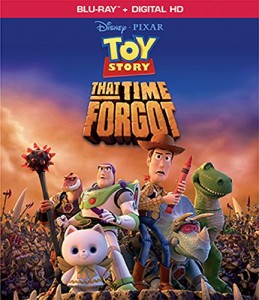 Let’s make our list, and check it twice, for toys–for girls and boys, and for the girls and boys we all used to be. I was a mere lad of 30 when Toy Story came out 20 years ago, and now me and my kids gather round the home screen to watch Buzz, Woody, and the gang in their three superb movies–and their TV offshoots. The magic is mostly intact, for a far briefer period, in their second small screen romp, Toy Story That Time Forgot, which pits them against a troupe of dinosaur action figures (led by Rome‘s Kevin McKidd) that can’t quite get with the whole “toy” thing. Like the last Transformers movie, with its “dinobots,” the notion that this is a Christmas-ready sales pitch hangs in the air. Still, it’s Toy Story, and as we await a third sequel I’ll get my fix where I can. Extras include more about the fearsome “battlesaurs,” a filmmaker commentary, and an account of a trip to Comic-Con for the franchise. (Toy Story at a toy con–there’s Toy Story 4 right there!)
Let’s make our list, and check it twice, for toys–for girls and boys, and for the girls and boys we all used to be. I was a mere lad of 30 when Toy Story came out 20 years ago, and now me and my kids gather round the home screen to watch Buzz, Woody, and the gang in their three superb movies–and their TV offshoots. The magic is mostly intact, for a far briefer period, in their second small screen romp, Toy Story That Time Forgot, which pits them against a troupe of dinosaur action figures (led by Rome‘s Kevin McKidd) that can’t quite get with the whole “toy” thing. Like the last Transformers movie, with its “dinobots,” the notion that this is a Christmas-ready sales pitch hangs in the air. Still, it’s Toy Story, and as we await a third sequel I’ll get my fix where I can. Extras include more about the fearsome “battlesaurs,” a filmmaker commentary, and an account of a trip to Comic-Con for the franchise. (Toy Story at a toy con–there’s Toy Story 4 right there!)
After exploring his dark side in The Gift, the funster Jason Bateman spritzes docu-nuggets in A Lego Brickumentary, narrating a surprisingly engrossing (if lightly promotional) documentary about the storied Danish company (No. 2 in the world), its product lines (there are 100 Lego pieces for every person on the planet), and the likable obsessives who build crazy-mad structures (Rivendell!) with them. Himself “Lego-ed” (ahem, “Minifigured”), Bateman walks us through, brick by brick, as Lego becomes a thing, nearly capsizes, and then rights itself by listening to users and extending itself to licensed brands and of course The Lego Movie. Most compelling is a segment on how the blocks are used for therapy for autistic children. It’s a good gateway drug to get kids interested in documentaries. (Do not, however, let them watch the supplementary segment on Legoland, or risk them begging you to take them right now. I lived through this.)
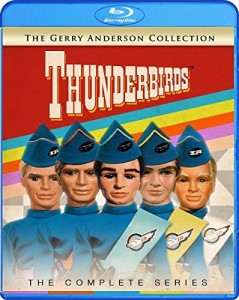 One facet of the brickumentary is Lego fans who make stop-motion movies with them. (The Pulp Fiction is unexpected.) Another”moving” venture, this one from the annals of puppetry, is celebrating its 50th anniversary with a smashing Blu-ray box set. Thunderbirds: The Complete Series spotlights Gerry Anderson’s “Supermarionation” wonders, which were lampooned by Team America: World Police, but deserve greater attention and affection here. (The Brits practically worship the Tracy family and Lady Penelope, and a new series has been launched.) The two movie spin-offs, shown on TCM, are on Blu-ray (one has a marionette Cliff Richard!) but I hadn’t seen the show in decades, and I was charmed by the exploits of International Rescue against The Hood all over again. Amazed, too, at how much the stringed performers go through, with explosions and all manner of family-friendly chaos every half hour. Great fun, with a fantastic image and crisp remastered sound, plus a welcome retrospective documentary on the whole phenomenon. (An earlier, black and white program from Anderson, Fireball XL5: The Complete Series, the saga of Captain Zodiac and the World Space Patrol, is also available.)
One facet of the brickumentary is Lego fans who make stop-motion movies with them. (The Pulp Fiction is unexpected.) Another”moving” venture, this one from the annals of puppetry, is celebrating its 50th anniversary with a smashing Blu-ray box set. Thunderbirds: The Complete Series spotlights Gerry Anderson’s “Supermarionation” wonders, which were lampooned by Team America: World Police, but deserve greater attention and affection here. (The Brits practically worship the Tracy family and Lady Penelope, and a new series has been launched.) The two movie spin-offs, shown on TCM, are on Blu-ray (one has a marionette Cliff Richard!) but I hadn’t seen the show in decades, and I was charmed by the exploits of International Rescue against The Hood all over again. Amazed, too, at how much the stringed performers go through, with explosions and all manner of family-friendly chaos every half hour. Great fun, with a fantastic image and crisp remastered sound, plus a welcome retrospective documentary on the whole phenomenon. (An earlier, black and white program from Anderson, Fireball XL5: The Complete Series, the saga of Captain Zodiac and the World Space Patrol, is also available.)
A nice stocking stuffer is The Last Unicorn (1982), a special edition version of one of those animated features that gained a toehold with younger viewers in the absence of much from Disney. I saw bits and pieces of it on cable over the years, but never the whole thing–kids stuff. Watching it with my children, I was pleasantly surprised by how grown up it is, as the title creature (voiced by Mia Farrow) ventures forth to see if she really is the last unicorn. The journey introduces her to cast of vivid characters that include a comical butterfly (Robert Klein, whose turn anticipates Robin Williams in Aladdin), a witch (Angela Lansbury), a sorcerer (Alan Arkin), a bandit’s wife (Tammy Grimes, stealing the show), a king (the late Christopher Lee), and the king’s adopted son (Jeff Bridges), who figures in the film’s twist. There’s a melancholy to it that pulled me in, and didn’t put off the kids, though they did note how “old-looking” it is. The low-fi Rankin/Bass animation looks about as good as it could here, and there’s a DTS-HD Master Audio 5.1 mix supporting Jimmy Webb’s score (sung by America). Fantasy scribe Peter S. Beagle is among commentary and featurette interviewees discussing his book’s trek to the screen and its half-life since. (He wasn’t thrilled with Rankin/Bass, and was in lengthy litigation over the film’s profits, but is touched by its enduring cult.)
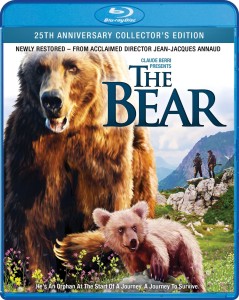 How hard is it to make a movie about a bear? Charlie Sheen, George Clooney, and Laura Dern never got to finish their 1987 sequel to Grizzly (1976), and Billy Bob Thornton and Thomas Jane probably hoped that this year’s unfinished-looking Into the Grizzly Maze would never surface. (No such luck; it’s on VOD now, and hard to “bear.”) Perhaps because The Bear (1988) was a more benign and upbeat project, about an orphaned cub who tags along with a wary elder tracked by hunters, the dearly departed Bart, the go-to ursus for these things in his time, gave filmmaker Jean-Jacques Annaud his full cooperation. The director tells the whole incredible story of his passion project’s history in a terrific making-of that supplements a gorgeous 4k restoration of the Dolomites-shot feature, which has its silly side (the cub has dreams) yet nonetheless succeeds in bringing us closer to the animal kingdom. (Annaud’s new film in this vein, the China-made Wolf Totem, gets a 3D Blu-ray release next month.)
How hard is it to make a movie about a bear? Charlie Sheen, George Clooney, and Laura Dern never got to finish their 1987 sequel to Grizzly (1976), and Billy Bob Thornton and Thomas Jane probably hoped that this year’s unfinished-looking Into the Grizzly Maze would never surface. (No such luck; it’s on VOD now, and hard to “bear.”) Perhaps because The Bear (1988) was a more benign and upbeat project, about an orphaned cub who tags along with a wary elder tracked by hunters, the dearly departed Bart, the go-to ursus for these things in his time, gave filmmaker Jean-Jacques Annaud his full cooperation. The director tells the whole incredible story of his passion project’s history in a terrific making-of that supplements a gorgeous 4k restoration of the Dolomites-shot feature, which has its silly side (the cub has dreams) yet nonetheless succeeds in bringing us closer to the animal kingdom. (Annaud’s new film in this vein, the China-made Wolf Totem, gets a 3D Blu-ray release next month.)
More family suggestions? There’s the Blu-ray debut of Pee-Wee’s Christmas Special and, on DVD, The Glen Campbell Goodtime Hour: Christmas Specials. Pee-Wee and Glen Campbell, two tastes that go well together with eggnog.
Let’s leave the children’s table and hit the afterparty, where we let our hair down with “adult” entertainment. Barnes & Noble is having its twice-annual Criterion Collection sale, a great opportunity for holiday shopping, or just treating yourself.
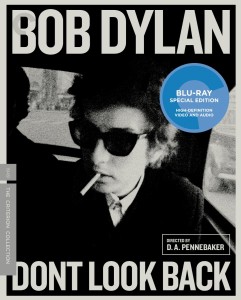 So you’ve made it through 18 CDs worth of Bob Dylan takes, outtakes, and whatever else is within that Bootleg megaset, and you still want more? It’s Criterion to the rescue with its definitive release of Don’t Look Back (1967), one of the great musician docs, from that same fertile, difficult period of his artistic development. Maybe the great musician doc, with that impish “Subterranean Homesick Blues” cue card sequence, offstage antics with Joan Baez and an in-the-crosshairs Donovan, press baiting, and a whole lot of creative and behavioral gold while touring Britain that fell into documentarian D.A. Pennebaker’s lap. The film has been available on home video before, as if I have to tell Dylanologists. But, just as you double- or triple-dipped to hear Dylan blow takes 50 years after the fact, look out for this edition of Don’t Look Back. Featuring: a director-approved 4k transfer with uncompressed mono sound on the Blu-ray, some of Pennebaker’s earlier short films, archival commentary and interviews with Pennebaker, Greil Marcus, and tour manager Bob Neuwirth, audio recordings of Dylan songs not used in the film and his thoughts on the film and its period, drawn from the documentary No Direction Home, and a new interview with Patti Smith. Patti Smith. You’ve ordered already.
So you’ve made it through 18 CDs worth of Bob Dylan takes, outtakes, and whatever else is within that Bootleg megaset, and you still want more? It’s Criterion to the rescue with its definitive release of Don’t Look Back (1967), one of the great musician docs, from that same fertile, difficult period of his artistic development. Maybe the great musician doc, with that impish “Subterranean Homesick Blues” cue card sequence, offstage antics with Joan Baez and an in-the-crosshairs Donovan, press baiting, and a whole lot of creative and behavioral gold while touring Britain that fell into documentarian D.A. Pennebaker’s lap. The film has been available on home video before, as if I have to tell Dylanologists. But, just as you double- or triple-dipped to hear Dylan blow takes 50 years after the fact, look out for this edition of Don’t Look Back. Featuring: a director-approved 4k transfer with uncompressed mono sound on the Blu-ray, some of Pennebaker’s earlier short films, archival commentary and interviews with Pennebaker, Greil Marcus, and tour manager Bob Neuwirth, audio recordings of Dylan songs not used in the film and his thoughts on the film and its period, drawn from the documentary No Direction Home, and a new interview with Patti Smith. Patti Smith. You’ve ordered already.
The French Lieutenant’s Woman (1981) was a notable arthouse hit in its day, doing brisk business and earning five Oscar nominations. After its initial cable run (where I saw it) it seemed to vanish. Now it’s back–and where its bifurcated “postmodern” structure gave it novelty back then, today it fits right in with our “disruptive” modes of storytelling. Meryl Streep (in one of her quintessential “Meryl Streep” roles) and rising star Jeremy Irons are consumed in passionate affairs, one onscreen, as their actor characters film a Victorian drama, “The French Lieutenant’s Woman,” and one off, as the two performers begin an affair. Scripted by Harold Pinter, from John Fowles’ “unfilmable” novel, the piece is beautifully structured, with reel and real endings that brings you up short, in that haunting, Pinter way. An undervalued film, one of several directed by Karel Reisz, whose Who’ll Stop The Rain (1978) requires similar attention. Some great supplements here, including a half-hour session with Streep and Irons, an overview of the film from scholar Ian Christie, and a piece about its terrific score, which composer Carl Davis walks us through.
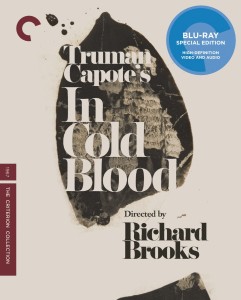 Richard Brooks’ 1967 adaptation of Truman Capote’s In Cold Blood has never gone away; in fact it’s been on Blu-ray twice already, singly and paired with the Oscar-winning Capote (2005). This, however, is also definitive. It offers a 4k restoration of its legendary black-and-white cinematography, shot by Oscar nominee Conrad Hall (rain tears!) at the actual locations of the infamous Clutter family murder, and Quincy Jones’ Oscar-nominated score in 5.1 DTS-HD. (If not the last Hollywood film of that period filmed in B/W, it was among the last.) Both these contributions are extensively discussed in the supplements, not least by the film’s nominated director and adapter, Richard Brooks, in a lengthy interview from 1988. Capote’s not slighted: Albert and David Maysles’ short documentary “With Love from Truman,” as the author’s book tour returns him to the scene of the crime in Kansas, is included, as are two NBC interviews with the writer. Bonnie and Clyde and The Graduate captured the zeitgeist that year, but In Cold Blood also endures, making this an essential release.
Richard Brooks’ 1967 adaptation of Truman Capote’s In Cold Blood has never gone away; in fact it’s been on Blu-ray twice already, singly and paired with the Oscar-winning Capote (2005). This, however, is also definitive. It offers a 4k restoration of its legendary black-and-white cinematography, shot by Oscar nominee Conrad Hall (rain tears!) at the actual locations of the infamous Clutter family murder, and Quincy Jones’ Oscar-nominated score in 5.1 DTS-HD. (If not the last Hollywood film of that period filmed in B/W, it was among the last.) Both these contributions are extensively discussed in the supplements, not least by the film’s nominated director and adapter, Richard Brooks, in a lengthy interview from 1988. Capote’s not slighted: Albert and David Maysles’ short documentary “With Love from Truman,” as the author’s book tour returns him to the scene of the crime in Kansas, is included, as are two NBC interviews with the writer. Bonnie and Clyde and The Graduate captured the zeitgeist that year, but In Cold Blood also endures, making this an essential release.
Australia’s Bruce Beresford broke through internationally with his great 1980 film Breaker Morant, concerning a travesty of justice. Adapted from a play that was produced during the Vietnam war (and an Oscar nominee for its script), Beresford’s film cross-examines the battlefield and the courtroom. It’s set during the Boer War in South Africa, where the first concentration camps were erected (by the British) and the term ”commando” was introduced. Fighting the stealthy Boers, Anglo-Australian horse breaker Harry Morant (Edward Woodward) and two other members of the Bushveldt Carbiniers (Bryan Brown and Lewis Fitz-Gerald) were court-martialed when the murder of their prisoners embarrassed Britain’s already compromised notion of ”civilized” soldiering. An underprepared defense attorney (Jack Thompson) scores points against the Empire and its manipulative conduct during the sham trial, but akin to Stanley Kubrick’s Paths of Glory (1957) it’s for naught. The closing scenes pack a wallop. Extras include: New interviews with Beresford, Brown, and DP Donald McAlpine, a piece about the Boer War, a 1973 documentary about Morant, and a 2011 update to that doc that recasts events from the actual history, without invalidating Breaker Morant’s points.
After the Oscar-winning success of Driving Miss Daisy, Beresford trekked to Nigeria for a lesser-known film ripe for rediscovery, Mister Johnson (1989). This is an exceedingly dry and at times bleakly comic drama, from a novel by Joyce Cary, about the clerk of the film’s title (Maynard Eziashi), who, in the colonial era, models himself on a district officer (Pierce Brosnan). His all-consuming adoption of English values soon has him colliding with the townspeople and the authorities, with tragic consequences. Pushing all kinds of buttons, Eziashi is impeccable as a “triggering” character, incarnating the very system that imprisons his people with their First World values. If you liked Breaker Morant, its twin in some respects, you’ll…well, get them both and see how you react. Eziashi, Brosnan (excellent), and Beresford offer insights, as does producer Michael Fitzgerald, who says that filming Cary’s novel was a passion project of John Huston’s. It came into good hands.
Criterion walks on the wild side with The Brood (1979), where, after some earlier attempts, Canada’s David Cronenberg really stepped up and became “David Cronenberg,” the master of body horror. Internalizing his own divorce and child custody issues, then exploding them onscreen, the filmmaker came up with a truly original and personal vision, completely “out there” but also rigorously controlled. Everything is perfectly tended to, including its wild man star Oliver Reed, who was clearly fascinated by the material and gives a great performance as a not-so-mad doctor, as does Samantha Eggar as his prize patient, a monster of fertility. (Clinging to the lifeboat of this one standout credit, it’s pitiful the dreck they were drowing in around the same time.) A vibrant Eggar and her co-stars Art Hindle (playing her suspicious ex) and Cindy Hinds (their daughter) are among the supplemental interviewees, with Cronenberg on hand to discuss his early work (his short feature, 1970’s Crimes of the Future, is also included). Hear from Reed, Orson Welles–and Charo–in a rollicking Merv Griffin Show episode from 1980. Criterion has been revisiting Cronenberg’s catalog for some time now, and I can only hope a Blu-ray of Dead Ringers (1988), with Irons, is up next.
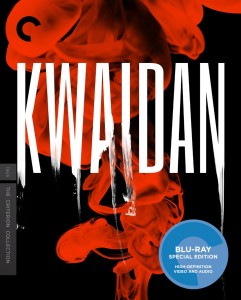 Masaki Kobayashi’s three-story omnibus Kwaidan (1964) has been part of the Criterion Collection since laserdisc. It’s now on Blu-ray–in its proper form as a four-story omnibus from the writings of Lafcadio Hearn, as the second story, “The Woman in the Snow,” was dropped when it played the 1965 Cannes Film Festival and fanned outwards. You may not have seen Kwaidan, but chances are you have seen stills of some of its incredible color imagery, including “Hoichi the Earless,” the story of a man who disguises himself with tattoos to hide from ghosts, a ruse that almost works. This three-hour fever dream of a movie has a tremendous minimalist score by Toru Takemitsu, fitting accompaniment for a journey into the unknown. Prior releases didn’t have much in the way of supplements; this one has a commentary from Stephen Prince, who has spoken on a number of Akira Kurosawa discs, a segment about the intriguing Hearn, an archival interview with Kobayashi, and a new interview with AD Kyoshi Ogasawara on the film’s obsessively controlled, studio-bound production.
Masaki Kobayashi’s three-story omnibus Kwaidan (1964) has been part of the Criterion Collection since laserdisc. It’s now on Blu-ray–in its proper form as a four-story omnibus from the writings of Lafcadio Hearn, as the second story, “The Woman in the Snow,” was dropped when it played the 1965 Cannes Film Festival and fanned outwards. You may not have seen Kwaidan, but chances are you have seen stills of some of its incredible color imagery, including “Hoichi the Earless,” the story of a man who disguises himself with tattoos to hide from ghosts, a ruse that almost works. This three-hour fever dream of a movie has a tremendous minimalist score by Toru Takemitsu, fitting accompaniment for a journey into the unknown. Prior releases didn’t have much in the way of supplements; this one has a commentary from Stephen Prince, who has spoken on a number of Akira Kurosawa discs, a segment about the intriguing Hearn, an archival interview with Kobayashi, and a new interview with AD Kyoshi Ogasawara on the film’s obsessively controlled, studio-bound production.
Kurosawa. If all you know is period adventures, time to get acquainted with Ikiru (1952), one of cinema’s great humanist works. The colorless Mr. Watanabe (Takashi Shimura, the future leader of The Seven Samurai and a human star of the original Gojira/Godzilla two years later), a bureaucrat, is so dead behind the eyes, so buried in paperwork, that his colleagues call him “the mummy.” When Watanabe (such an amazing performance by Shimura) learns that he really is dying, he resolves “to live” (the translation of the film’s title) and after a false start living the high life quietly makes his hidebound bureacracy work for him as a renewed energy takes hold. His final, snowbound scene is killer. I dearly love this deeply poignant and inspiring movie, which I discovered as a Criterion laserdisc years ago. A 4k restoration is supplemented by one of Prince’s great commentaries, a 90-minute doc about Kurosawa, and a program about the film itself. Essential.
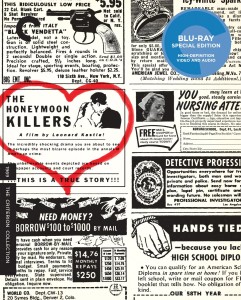 Let’s close out Criterion with another one of my favorite movies, The Honeymoon Killers (1969), also given a 4k sprucing-up. Francois Truffaut and John Waters loved it, too–and if you have a bent for macabre true crime stories, laced with dark humor, brimming with strong (if mostly suggested) violence, and pulsing with an unexpected romanticism, get this Blu-ray. Martha (Shirley Stoler), an overweight and frustrated nurse in Mobile, AL., strikes up a lonelyhearts correspondence with Ray (Tony Lo Bianco), a New York gigolo. Once they meet, Ray involves her in his schemes to marry and bilk lonely women–but Martha, failing to convince as his sister, and unable to conceal her jealousy, escalates their plans to multiple homicide. (Waters and his big star clearly modeled aspects of the “Divine” persona on Stoler’s downturned, no-nonsense performance, one that’s also naggingly sad in the first-time film actress’ unforgettable portrayal.) Horrifying, but also heartbreaking (and often deadpan funny), the film was a false start for would-be director Martin Scorsese, who for taking too long was fired and replaced by Leonard Kastle–a one-and-done filmmaker who boasts, cheekily, of never having made a bad movie in the supplements. He did not–everything works, including the Mahler soundtrack and Oliver Wood’s stark B/W cinematography. (The image is so clear you can make out the titles of records glimpsed on shelves, confirming that the movie, based on 40s events, is set in its present–while still feeling somehow period.) Lo Bianco, a superb lounge lizard (“Does ‘spinster’ mean ‘maiden?'”) in his starring debut, is also heard from in the extras, and there’s an absorbing new feature about the actual killing spree by Sing Sing Prison historian Scott Christianson. Also essential if your taste flows in this direction–and deeply, disturbingly humanist as well.
Let’s close out Criterion with another one of my favorite movies, The Honeymoon Killers (1969), also given a 4k sprucing-up. Francois Truffaut and John Waters loved it, too–and if you have a bent for macabre true crime stories, laced with dark humor, brimming with strong (if mostly suggested) violence, and pulsing with an unexpected romanticism, get this Blu-ray. Martha (Shirley Stoler), an overweight and frustrated nurse in Mobile, AL., strikes up a lonelyhearts correspondence with Ray (Tony Lo Bianco), a New York gigolo. Once they meet, Ray involves her in his schemes to marry and bilk lonely women–but Martha, failing to convince as his sister, and unable to conceal her jealousy, escalates their plans to multiple homicide. (Waters and his big star clearly modeled aspects of the “Divine” persona on Stoler’s downturned, no-nonsense performance, one that’s also naggingly sad in the first-time film actress’ unforgettable portrayal.) Horrifying, but also heartbreaking (and often deadpan funny), the film was a false start for would-be director Martin Scorsese, who for taking too long was fired and replaced by Leonard Kastle–a one-and-done filmmaker who boasts, cheekily, of never having made a bad movie in the supplements. He did not–everything works, including the Mahler soundtrack and Oliver Wood’s stark B/W cinematography. (The image is so clear you can make out the titles of records glimpsed on shelves, confirming that the movie, based on 40s events, is set in its present–while still feeling somehow period.) Lo Bianco, a superb lounge lizard (“Does ‘spinster’ mean ‘maiden?'”) in his starring debut, is also heard from in the extras, and there’s an absorbing new feature about the actual killing spree by Sing Sing Prison historian Scott Christianson. Also essential if your taste flows in this direction–and deeply, disturbingly humanist as well.
Something to Shout! about. Shirley Stoler makes a memorable appearance toward the end of Miami Blues (1990), where another charming lawbreaker (Alec Baldwin) is redeemed, a little, by a good-hearted prostitute (Jennifer Jason Leigh). But Baldwin’s recidivist crook is more aggressively sociopathic than Ray, right from the get-go casually murdering a Hare Krishna at the Miami airport, then tormenting the slow-seeming cop on the case (Fred Ward) by stealing his gun, badge–and dentures. It’s the comical details and the sexy and credibly heartfelt romance that stand out in a net-noir-ish portrait of the city in its post-Scarface and Miami Vice days, sunny yet wilted. Directed by George Armitage (Grosse Point Blank), from a novel by Charles Willeford (Ward should’ve done a whole series of these), the movie has some of the sensibility of producer Jonathan Demme as well. In an interview segment (“Look at that skinny guy!” he says, watching himself in the 25-year-old movie), Baldwin compares Miami Blues to Demme’s 1986 masterpiece Something Wild, an apt connection I had never made. He and Leigh talk thoughtfully about a film that clearly means something to them, in contrast to interviews that are like pulling teeth for the participants. It’s heartening to love a movie, and to know that the people who made it love it, too.
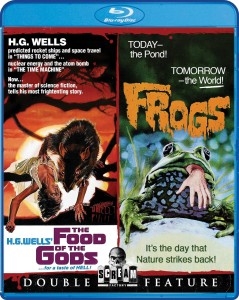 When animals attack: Someone had the good sense to twin The Food of the Gods (1976) with Frogs (1972) in one slithery Blu-ray package, for a slice of 70s eco-horror. Filmmaker Bert I. Gordon, AKA “Mr. B.I.G.,” who earned his nickname with “giant” movies like The Amazing Colossal Man (1957) and Earth vs. the Spider (1958), returned to the genre with one of his “biggest” hits, as a bubbling goo gives rats, worms, wasps, and other critters a size advantage over mere mortals like Ida Lupino, Ralph Meeker, and star Marjoe Gortner, who was kind of the poor man’s Matthew McConaughey back then. The 93-year-old Gordon supplies a sporadic commentary track, with co-star Belinda Balaski sharing a few anecdotes in an interview. Humorously referenced in the Robert Altman film A Wedding (1978), Frogs stars Ray Milland as a grouchy, island-dwelling millionaire callously despoiling his environment, which leads to an active revolt among the smaller species. Will co-stars Joan Van Ark and Sam Elliott “croak”? Not the most persuasive battle, maybe (the lizards can’t do too much except swat bottles of toxin off shelves), the movie, like Gods, is still good fun, with plenty of amphibians glistening green on Blu. You’d think Van Ark would run away from her debut film role, but, no, here she is, sharing funny stories in a new interview.
When animals attack: Someone had the good sense to twin The Food of the Gods (1976) with Frogs (1972) in one slithery Blu-ray package, for a slice of 70s eco-horror. Filmmaker Bert I. Gordon, AKA “Mr. B.I.G.,” who earned his nickname with “giant” movies like The Amazing Colossal Man (1957) and Earth vs. the Spider (1958), returned to the genre with one of his “biggest” hits, as a bubbling goo gives rats, worms, wasps, and other critters a size advantage over mere mortals like Ida Lupino, Ralph Meeker, and star Marjoe Gortner, who was kind of the poor man’s Matthew McConaughey back then. The 93-year-old Gordon supplies a sporadic commentary track, with co-star Belinda Balaski sharing a few anecdotes in an interview. Humorously referenced in the Robert Altman film A Wedding (1978), Frogs stars Ray Milland as a grouchy, island-dwelling millionaire callously despoiling his environment, which leads to an active revolt among the smaller species. Will co-stars Joan Van Ark and Sam Elliott “croak”? Not the most persuasive battle, maybe (the lizards can’t do too much except swat bottles of toxin off shelves), the movie, like Gods, is still good fun, with plenty of amphibians glistening green on Blu. You’d think Van Ark would run away from her debut film role, but, no, here she is, sharing funny stories in a new interview.
Onwards to Poverty Row, or near enough: Two less aspirational but no less welcome Blu-ray releases of late show favorites from 1959, The Bat and A Bucket of Blood. More a standard (very standard) mystery than a horror movie, The Bat stars Vincent Price in an old dark house thriller that was creaking pretty loudly even back in its day. He makes anything worth seeing (1983’s variation on the theme, House of Long Shadows, is also now available, teaming Price with Peter Cushing, Christopher Lee, and John Carradine) and Agnes Moorehead and Little Rascal Darla Hood are along for some minor chills. Better is the cult favorite A Bucket of Blood, with beloved character actor Dick Miller as a beatnik artist who finds his art in corpses. Roger Corman and screenwriter Charles B. Griffith reunited for the better known Little Shop of Horrors (1960), but this, too, is a diamond in the no-budget rough, an art world satire with a great central performance. It needs a musical–but until then both these public domain titles are freshened with decent transfers in their original aspect ratios.
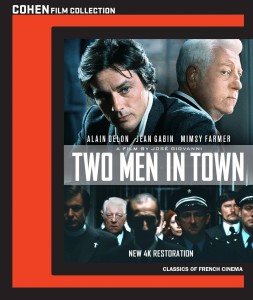 Stars. We live in a world where young and handsome Alain Delon, of Purple Noon (1960), The Leopard (1963), Le Samourai (1967), and The Concorde: Airport ’79, just turned 80. Happy birthday–and don’t kill me for funning you about the last one, which, if your fearsome rep is even partly true, you might could do. Two Men in Town (1973) was the last of his pairings with another great French star, Jean Gabin, and a more serious one than the gambling caper Any Number Can Win (1963) and a favorite of mine, The Sicilian Clan (1969). Delon produced this one, and stars as a safecracker trying to go straight, aided by Gabin’s social worker. The straight path is a difficult one to negotiate, however, as his former associates (including the up-and-coming Gerard Depardieu in a small role) and a bent cop (Michel Bouquet) keep tugging at him, as he tries to stick to a job and start a lasting relationship (with a woman played by cult actress Mimsy Farmer, who has spent much of her career in Europe). It’s a familiar tale well told by director Jose Giovanni, with the expected action and some sociopolitical commentary doled out by Gabin, and the 4k restoration is stunning. The disc includes a sparse but informative commentary by Gabin biographer Claude Zigman. (Forest Whitaker and Harvey Keitel starred in a recent remake; Delon fans should seek out one of his better American roles, in 1973’s spy thriller Scorpio, which is also on Blu-ray now.)
Stars. We live in a world where young and handsome Alain Delon, of Purple Noon (1960), The Leopard (1963), Le Samourai (1967), and The Concorde: Airport ’79, just turned 80. Happy birthday–and don’t kill me for funning you about the last one, which, if your fearsome rep is even partly true, you might could do. Two Men in Town (1973) was the last of his pairings with another great French star, Jean Gabin, and a more serious one than the gambling caper Any Number Can Win (1963) and a favorite of mine, The Sicilian Clan (1969). Delon produced this one, and stars as a safecracker trying to go straight, aided by Gabin’s social worker. The straight path is a difficult one to negotiate, however, as his former associates (including the up-and-coming Gerard Depardieu in a small role) and a bent cop (Michel Bouquet) keep tugging at him, as he tries to stick to a job and start a lasting relationship (with a woman played by cult actress Mimsy Farmer, who has spent much of her career in Europe). It’s a familiar tale well told by director Jose Giovanni, with the expected action and some sociopolitical commentary doled out by Gabin, and the 4k restoration is stunning. The disc includes a sparse but informative commentary by Gabin biographer Claude Zigman. (Forest Whitaker and Harvey Keitel starred in a recent remake; Delon fans should seek out one of his better American roles, in 1973’s spy thriller Scorpio, which is also on Blu-ray now.)
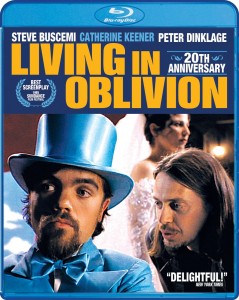 A nobody making his film debut in 1995, Game of Thrones Emmy winner Peter Dinklage now dominates the Blu-ray cover art of Living in Oblivion, pushing Steve Buscemi and Catherine Keener off to the side. It’s a bit of a cheat–Dinklage isn’t the star of Tom DiCillo’s satire of no-budget filmmaking in New York, but he does have a plum role, as an angry dwarf actor who disrupts Buscemi’s would-be work of art dream sequence by walking off the set. (“I don’t even have dreams with dwarves in them!”) It’s a funny, sharply observed movie before that, a time capsule of the 90s indie era, but Dinklage briefly pushes its caustic, low-key humor into overdrive, and off he went to larger parts and TV stardom. He did return to the movie for this welcome special edition, appearing in an affectionate making-of with DiCillo, Buscemi, and co-stars James Le Gros (not parodying Brad Pitt, the star of DiCillo’s earlier Johnny Suede) and Danielle von Zerneck. A lot of films from that febrile period for independent filmmakers in the 80s and 90s are hard to find today on DVD, much less Blu, but Oblivion, which also includes a DiCillo commentary, is a welcome rescue.
A nobody making his film debut in 1995, Game of Thrones Emmy winner Peter Dinklage now dominates the Blu-ray cover art of Living in Oblivion, pushing Steve Buscemi and Catherine Keener off to the side. It’s a bit of a cheat–Dinklage isn’t the star of Tom DiCillo’s satire of no-budget filmmaking in New York, but he does have a plum role, as an angry dwarf actor who disrupts Buscemi’s would-be work of art dream sequence by walking off the set. (“I don’t even have dreams with dwarves in them!”) It’s a funny, sharply observed movie before that, a time capsule of the 90s indie era, but Dinklage briefly pushes its caustic, low-key humor into overdrive, and off he went to larger parts and TV stardom. He did return to the movie for this welcome special edition, appearing in an affectionate making-of with DiCillo, Buscemi, and co-stars James Le Gros (not parodying Brad Pitt, the star of DiCillo’s earlier Johnny Suede) and Danielle von Zerneck. A lot of films from that febrile period for independent filmmakers in the 80s and 90s are hard to find today on DVD, much less Blu, but Oblivion, which also includes a DiCillo commentary, is a welcome rescue.
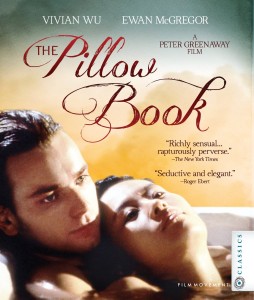 Ewan McGregor–all of Ewan McGregor–stars in The Pillow Book (1996), one of Peter Greenaway’s arty oddities, and one of his last successes. There’s sensuality and plenty of skin–much of it tattooed, some of it not–as McGregor’s bisexual translator gets entangled with a Japanese woman (Joy Luck Club star Vivian Wu) who has a fetish for body art and a lust for vengeance against the publisher who wronged her father (Ken Ogata). Books, printed and “living,” come into play, and there’s a tremendous amount of surface texture accompanying multiple storylines that unfold and undulate. The Blu-ray recovers a lot of the fine A/V detail, and offers brief commentary from the filmmaker.
Ewan McGregor–all of Ewan McGregor–stars in The Pillow Book (1996), one of Peter Greenaway’s arty oddities, and one of his last successes. There’s sensuality and plenty of skin–much of it tattooed, some of it not–as McGregor’s bisexual translator gets entangled with a Japanese woman (Joy Luck Club star Vivian Wu) who has a fetish for body art and a lust for vengeance against the publisher who wronged her father (Ken Ogata). Books, printed and “living,” come into play, and there’s a tremendous amount of surface texture accompanying multiple storylines that unfold and undulate. The Blu-ray recovers a lot of the fine A/V detail, and offers brief commentary from the filmmaker.
For laughs, try Pierre Richard in The Tall Blond Man with One Black Shoe (1972). As a kid, I used to get up early and turn on the TV, which yielded very little other than snow and farm reports back then. Before kid shows like Wonderama came on, I do recall some TV spots for movies, including foreign ones I would never see back then. One of them was for this funny French farce, which I did see–in the form of its plodding American remake, The Man with One Red Shoe (1985). Thirty years later we have the original, and it’s a delight, as are many films written and/or directed by Francis Veber, like The Dinner Game (1999). That, too, was poorly remade, a common fate for Veber fare. Accept no substitutes and enjoy this one, where Richard’s innocent violinist is mixed up in slapstick spy games, with the great Bernard Blier and Jean Rochefort as rival agents triggering their share of the laughs as well.
The Bear‘s location footage put me in mind of mountains, which led me to a digital screener of Meru, one of this year’s documentary successes. Do you want to get high? Put this one on and prepare to reach your vertical limit, as climbers Conrad Anker (who discovered the body of George Mallory, d. 1924, on Everest decades later), Jimmy Chin, and Renan Ozturk attempt to reach the unobtainable Meru Peak in the Himalayas. Personal drama underscores this incredible document of their impossible feat, which is foolhardy even before they get to their forbidding destination. Co-directed by Chin and his spouse, Elizabeth Chai Vasarhelyi, with several different cameras, this makes for an awesome watch, even on my plebeian computer. The Blu-ray has separate commentary tracks with the directors and Anker and additional expedition footage, if you’re not too wrung out by the 90-minute feature.
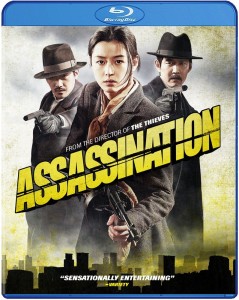 Three modes of Asian cinema this time. The fun stuff is represented by The Golden Cane Warrior, an Indonesian film stronger in mood and location atmosphere than martial arts action, though it is there. The two Raid movies that made a splash here are gritty, urban, and interior; this period fantasy gets outside a lot more, to showcase the country’s beautiful island vistas. In the foreground: the title character, an elderly woman who must pick her successor, from the four children (two male, two female) she raised after dispatching their criminal parents. Power plays and stick fighting ensue. If you go for this kind of movie (and I do) it’s worth the low price to see how another country’s cinema freshens the tropes.
Three modes of Asian cinema this time. The fun stuff is represented by The Golden Cane Warrior, an Indonesian film stronger in mood and location atmosphere than martial arts action, though it is there. The two Raid movies that made a splash here are gritty, urban, and interior; this period fantasy gets outside a lot more, to showcase the country’s beautiful island vistas. In the foreground: the title character, an elderly woman who must pick her successor, from the four children (two male, two female) she raised after dispatching their criminal parents. Power plays and stick fighting ensue. If you go for this kind of movie (and I do) it’s worth the low price to see how another country’s cinema freshens the tropes.
For the serious side, a slashing crime melodrama from China, Black Coal, Thin Ice. In 1999, body parts are turning up at coal-mining concerns across several provinces, and a detective with a few personal problems is assigned to the puzzling case. Everything goes violently fubar as the investigation closes in on a suspect. Several years later, the cold case heats up as the detective, now a security guard, moonlights to solve a fresh round of dismemberments, which seem tied to the wife of a victim in the last go-round–a woman the protagonist is obsessed with. An enigmatic neo-noir gets a lift from offbeat characterizations and glum wintry settings, suggesting China by way of Smilla’s Sense of Snow.
Somewhere in the middle is the large-scale Korean film Assassination. The setting is Japan-occupied Korea in 1933, and it’s about traitors and turncoats in a time of crisis and upheaval. That’s the heavy part. The rest is all-in action adventure, from the country that’s really stepped up and taken the lead in this sort of thing. A hitman has to be sprung from jail to accomplish the delicate task of the title–once that’s done (no small feat) it’s nonstop battles with spies, marksmen, snipers, and anyone else who stands in the way of justice. No extras here, and no problem–the Blu-ray presentation will knock your socks off, and once the movie’s done you’ll be incapable of operating the menu screen even if there were any.
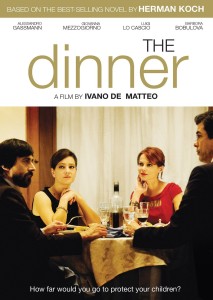 Onto Europe. Marie’s Story is an affecting one, paralleling one of my favorites, The Miracle Worker (1962). In the early 19th century, an artisan and his wife, unable to care for their deaf and blind daughter, turn the incorrigible 14-year-old over to a French institute for deaf children run by Catholic nuns. Marie is a seemingly hopeless case, ready for the asylum, but one nun observes untapped potential and attempts to educate her. It’s based on true events, and as a sucker for this sort of thing I fell into it. Ariana Rivoire, the deaf French student who plays Marie, is excellent.
Onto Europe. Marie’s Story is an affecting one, paralleling one of my favorites, The Miracle Worker (1962). In the early 19th century, an artisan and his wife, unable to care for their deaf and blind daughter, turn the incorrigible 14-year-old over to a French institute for deaf children run by Catholic nuns. Marie is a seemingly hopeless case, ready for the asylum, but one nun observes untapped potential and attempts to educate her. It’s based on true events, and as a sucker for this sort of thing I fell into it. Ariana Rivoire, the deaf French student who plays Marie, is excellent.
Finally, just in time for Thanksgiving, The Dinner. From a New York Times bestseller, this is a churning family saga, kind of an Italian version of the play God of Carnage (and the subsequent Roman Polanski film Carnage). Two brothers, with issues, bury the hatchet for monthly dinners at a fancy restaurant. When their wayward teenage children seem to be implicated in a crime caught on security cameras, the gloves come off, the veneer slips away, and war is declared over the evening’s meal. Soul baring is the main course as cash-rich but spiritually empty lives are filleted. The perfect accompaniment for your dreaded holiday gatherings–but you do have lots of movies to watch when you can get away.





Comments